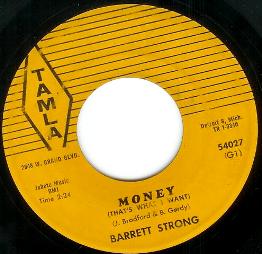Soul music is a popular music genre that originated in the African American community in the United States in the 1950s and early 1960s. It combines elements of African-American gospel music, rhythm and blues and jazz. Soul music became popular for dancing and listening in the United States, where record labels such as Motown, Atlantic and Stax were influential during the Civil Rights Movement. Soul also became popular around the world, directly influencing rock music and the music of Africa.
Power pop is a form of pop rock based on the early music of bands such as the Who, the Beatles, the Beach Boys, and the Byrds. It originated in the late 1960s as young music fans began to rebel against the emerging pretensions of rock music, and developed mainly among American musicians who came of age during the British Invasion. The genre typically incorporates melodic hooks, vocal harmonies, an energetic performance, and "happy"-sounding music underpinned by a sense of yearning, longing, or despair.

Chess Records was an American record company, founded in 1950 in Chicago and specializing in blues and rhythm and blues. Over time it expanded into soul music, gospel music, early rock and roll, and occasional jazz and comedy recordings, released on the Chess label and on its subsidiary labels Checker, Argo/Cadet and Cadet Concept. The entire Chess catalogue is currently owned by Universal Music Group and managed by Geffen Records.

The Beatles were an English rock band, formed in Liverpool in 1960. With members John Lennon, Paul McCartney, George Harrison and Ringo Starr, they are regarded as the foremost and most influential act of the rock era. In the early 1960s, their enormous popularity first emerged as "Beatlemania", but as the group's music grew in sophistication, led by primary songwriters Lennon and McCartney, the band were integral to pop music's evolution into an art form and to the development of the counterculture of the 1960s.

"Something" is a song by the English rock band the Beatles from their 1969 album Abbey Road. It was written by George Harrison, the band's lead guitarist. Soon after the album's release, the song was issued as a single, coupled with "Come Together", making it the first Harrison composition to become a Beatles A-side. Its pairing with "Come Together" was also the first time in the United Kingdom that the Beatles issued a single containing tracks that were already available on an album. The single topped the Billboard Hot 100 in the United States as well as charts in Australia, Canada, New Zealand and West Germany, and peaked at number 4 in the UK.

Aftermath is a studio album by English rock band the Rolling Stones. It was released in the United Kingdom on 15 April 1966 by Decca Records and in the United States on 20 June by London Records. The American edition featured a different cover and track listing, substituting the single "Paint It Black" in place of four of the British album's songs. Overall, it is the band's fourth British and sixth American studio release.

"Money " is a song written by Tamla founder Berry Gordy and Janie Bradford that became the first hit record for Gordy's Motown enterprise. The song was recorded in 1959 by Barrett Strong for the Tamla label, distributed nationally on Anna Records. It went on to be covered by many artists, including the Beatles in 1963 and the Flying Lizards in 1979.
Penelope Ann "Penny" Valentine was a British music journalist, rock critic, and occasional television personality.

The Rolling Stone Album Guide, previously known as The Rolling Stone Record Guide, is a book that contains professional music reviews written and edited by staff members from Rolling Stone magazine. Its first edition was published in 1979 and its last in 2004. The guide can be seen at Rate Your Music, while a list of albums given a five star rating by the guide can be seen at Rocklist.net.

"Lady Jane" is a song by the English rock group the Rolling Stones, penned by the group's songwriting duo of Mick Jagger and Keith Richards. It was initially included on their album, Aftermath. which was released on 12 April 1966 in the UK and 20 June 1966 in the US.

"What Is Life" is a song by the English musician George Harrison, released on his 1970 triple album All Things Must Pass. In many countries, it was issued as the second single from the album, in February 1971, becoming a top-ten hit in the United States, Canada and elsewhere, and topping singles charts in Australia and Switzerland. In the United Kingdom, "What Is Life" appeared as the B-side to "My Sweet Lord", which was the best-selling single there of 1971. Harrison's backing musicians on the song include Eric Clapton and the entire Delaney & Bonnie Friends band, with whom he had toured during the final months of the Beatles. Harrison co-produced the recording with Phil Spector, whose Wall of Sound production also employed a prominent string arrangement by John Barham and multiple acoustic rhythm guitars, played by Harrison's fellow Apple Records signings Badfinger.

Robert James Sheffield is an American music journalist and author.
Peter Bennett was a popular music promoter who worked with several prominent artists including the Beatles, the Rolling Stones, Elvis Presley, Bob Dylan, Frank Sinatra and the Jackson 5.
KRLA Beat was an American rock music magazine that operated between 1964 and 1968. It began in October 1964 as a free newsletter distributed by the Southern Californian radio station KRLA, before being reworked as a more reportage-focused title in February 1965. The music journalism archive Rock's Backpages describes KRLA Beat as "the first American newspaper dedicated to coverage of the top-forty rock-and-roll music scene".
Peter Doggett is an English music journalist, author and magazine editor. He began his career in music journalism in 1980, when he joined the London-based magazine Record Collector. He subsequently served as the editor there from 1982 to 1999, after which he continued in the role of managing editor. He has also contributed regularly to magazines such as Mojo, Q and GQ.
Paul Trynka is a British rock journalist and author. He was the editor of the music magazine Mojo from 1999 to 2003, and has also worked as editorial director of Q and editor of International Musician. In 2004, he edited publisher Dorling Kindersley's compilation of the Mojo Special Limited Edition issues on the Beatles. He has also written for The Independent and Classic Rock magazine, and contributed articles on music, fashion, design or travel for The Guardian, Elle and Blueprint, among other publications. Before turning to journalism, he worked as a professional musician, recording albums for the Beggars Banquet and Fantasy record labels.
Robert Bateman was an American R&B singer, songwriter and record producer. Among other songs, he co-wrote the hits "Please Mr. Postman" and "If You Need Me".



















